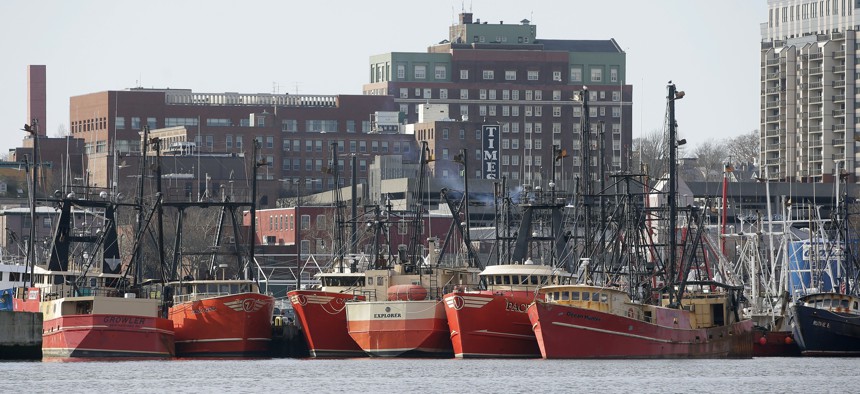Connecting state and local government leaders
Communities are becoming strategic about planning the use of their shorelines rather than relying solely on tourism and recreation to generate water-related revenue.
A growing handful of coastal states, cities and counties are focusing their economic development efforts on industries that rely on the ocean.
Participants in the so-called “blue economy,” shoreside communities contributed $385 billion to the gross domestic product in 2019 and supported 3 million jobs in more than 20 marine industries, including fishing, tourism, off-shore oil drilling and boat building, according to the Center for the Blue Economy in Monterey, California.
Although 30 states and 1,000 counties abut an ocean or another major body of water, some states, including Massachusetts, Rhode Island, Washington and Alaska, along with coastal cities like Gulfport, Mississippi and San Diego, have, over the past few years, become strategic about planning the use of their shorelines rather than relying solely on tourism and recreation to generate water-related revenue.
“In the absence of a plan … coastal communities can devolve into just T-shirts and taffy,” said Carolyn Kirk, executive director of the Massachusetts Technology Collaborative, a state economic development agency. “That’s not great economic development policy.”
Instead, she said, some coastal states and communities are getting serious about evaluating their coastal assets and determining what kinds of jobs they can support.
In Massachusetts, for example, Gloucester, New Bedford and Boston are deep-water ports, explained Kirk, the state’s former deputy secretary of Housing and Economic Development and the mayor of Gloucester from 2008 to 2015. Unlike harbors with shallower water, those ports can support large fishing boats.
Local officials there and in other communities with deep-water ports have to decide, “Do they become a parking lot for yachts and you turn over your working waterfront?” Kirk said.
The answer she noted, isn’t simple.
“These issues around surrendering working waterfronts are hot-button issues in a lot of these communities,” where some developers and business owners have pushed for rezoning to allow housing and tourism to displace deep-sea fishing, Kirk said.
“The community has the answer.”
Each Community Needs a Plan
Gloucester officials struck a balance by preserving the zoning that would protect the working waterfront in the city’s core. But they rezoned nearby areas for oceanfront housing and recreational businesses, Kirk said.
“It’s hard for them to co-exist,” she added. “What we emphasize at the state level is an economic development plan that has community input.”
In some communities, she said, officials “go street by street, property by property along the waterfront to see what zoning is needed.”
University of Massachusetts professor Katherine Kahl agreed that every coastal community needs its own plan.
The streets and sidewalks of Boston, for instance, have challenges with coastal flood waters that pool atop the concrete in a way that a community with a sandy beach or salt marsh on the oceanfront does not experience, said Kahl, an extension professor of coastal resistance and sustainable fisheries.
Her team polled “stakeholders” of northern Massachusetts’ coastal communities at the local and university levels, along with commercial and nonprofit business leaders, to determine the potential of their blue economies and the roadblocks that might keep them from capitalizing on the water as a way to produce goods and create jobs.
“Successful blue economy initiatives are really based in understanding what your regional strengths are, understanding what we have to work with,” said Kahl, who heads the UMass North Shore Blue Economyinitiative.
In northern Massachusetts, she said, assets include access to the ocean, and to Boston’s life sciences and finance community, a number of top universities, a railway and an eager commercial and nonprofit business sector.
“The North Shore is more than lobster rolls and getting sunburned on the beach for the day,” Kahl said. “How do we talk about the beauty and benefits of these communities to the talent we’re trying to retain, to companies that we are trying to recruit? How does [the way communities use their waterfronts] fit our sweet spot?”
Although tourism and recreation account for $133 billion of the $385 billion blue economy, according to the Center for the Blue Economy, Kahl said the jobs that sector creates—at an average salary of $25,000 per year—pay far less than positions in ship building, marine construction and climate change research.
“We want to keep the waterfront culture,” she said. “More jobs in these areas would not replace tourism. But there is an opportunity to grow different jobs.”
Her research is pointing to the need for coastal communities to reach inland to universities and vocational schools that can train the future employees of high-tech marine industries that might, for example, site energy-producing windmills in the ocean or monitor the impact of climate change on a community’s lobster population.
“How do we dive deeper on workforce training programs that are at the intersection of fisheries, marine tech, wind?” she asked. “What does the future of Massachusetts look like, and where’s the gap” in training and education?
‘Kickstarting’ Blue Economy Innovation
Charles Cogan, research director for the Center for the Blue Economy, said technical innovation and research like Kahl’s are “kickstarting” blue economy innovation, although most coastal communities already harness the economic benefit of their proximity to the ocean.
“It can vary hugely from kind of the centerpiece of what people are trying to do, to a footnote in their thinking,” said Cogan, whose organization collects data on the economic impact of the marine economy. “I don’t think there’s a lot of consistency in terms of intensity of interest. But I think there is certainly widespread interest, whether they call it the blue economy or not.”
In the last four years, he said, “the notion of the innovation blue economy has really taken off,” yet the federal government has barely pumped any funding into it. “The budget resources to match the awareness and interest have not been there.”

NEXT STORY: Western ‘Zoom Towns’ Take Aim at Short-Term Rentals



